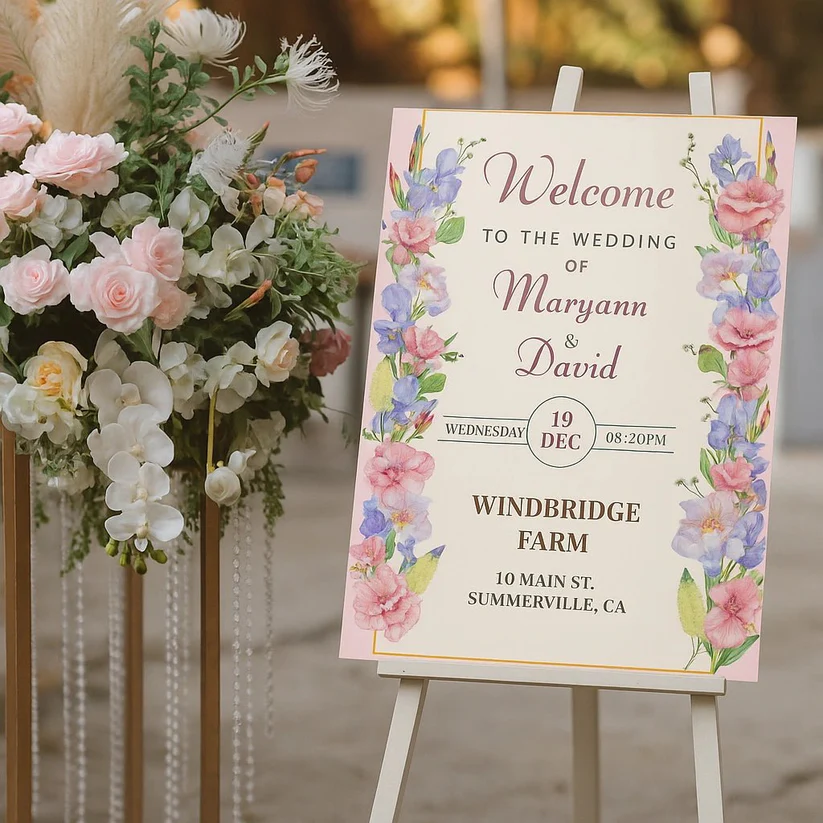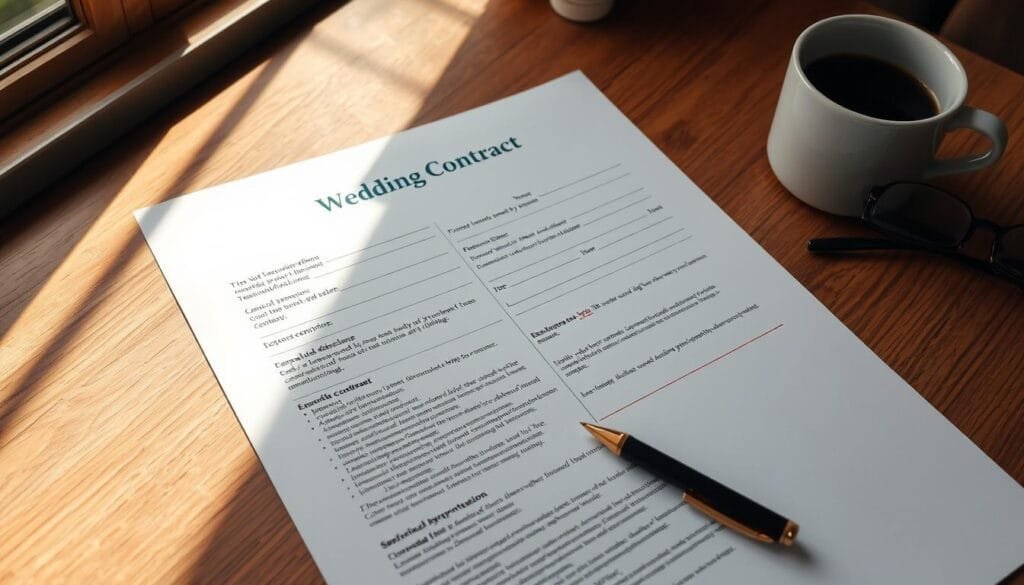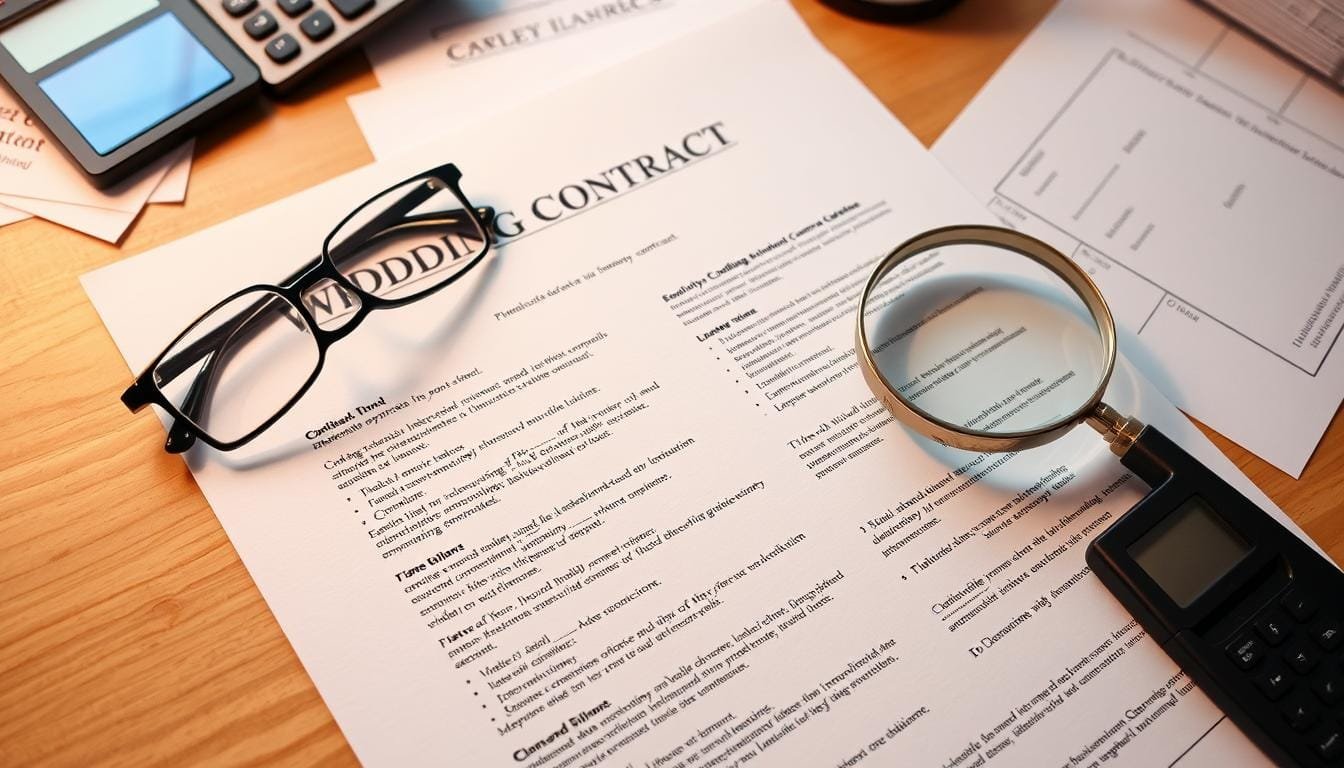We’ve all heard those horror stories – the photographer who ghosted after the engagement shoot, the bakery that delivered a lopsided cake, the florist who swapped peonies for carnations without mentioning it. I still remember my cousin’s voice cracking as she described her reception decor arriving three hours late – “It looked nothing like the Pinterest board!”
Here’s the hard truth: even the most magical wedding visions can unravel without clear agreements. Recent studies show most service agreements lack crucial details about quality standards and pricing fairness. But what if you could transform those flimsy handshake deals into ironclad plans that protect your budget and sanity? Luckily, we gathered the most important vendor contract tips to keep your wedding planning stress-free.
Let’s flip the script. Instead of crossing your fingers and hoping suppliers come through, imagine walking into every conversation knowing exactly how to secure what you want. We’re talking specific timelines, exact material lists, and backup plans baked right into your agreements – no law degree required.
The First Impression of Your Dream Day
Your contracts ensure every vendor helps create your perfect day. Now, you can bring that vision to life from the moment guests arrive with an elegant welcome sign that introduces your love story. Bring your vision to life.

Key Takeaways
- Detailed agreements prevent 83% of common wedding day mishaps
- Clear quality benchmarks help suppliers exceed expectations
- Price-match clauses keep budgets from spiraling
- Penalty systems encourage on-time delivery
- Digital document storage ensures easy access
This isn’t about mistrust – it’s about creating partnerships where everyone wins. By the time we’re done, you’ll have a toolkit that turns stressful negotiations into collaborative conversations. Ready to make “wedding day disasters” someone else’s story?
Introduction
Ever get that pit-in-your-stomach feeling when someone hands you a stack of paperwork? You’re not alone. That gorgeous cake design or floral arrangement you’ve been dreaming about comes with something less exciting – agreements that read like legal novels. But here’s the twist: those documents are actually your backstage pass to wedding-day confidence.
- Turn vague promises into specific action plans
- Create shared goals between you and your team
- Give everyone room to shine in their roles
I learned this the hard way when a makeup artist showed up two hours late to my sister’s wedding. The contract? It had a single line about arrival times. Now I always look for exact schedules and backup artist clauses.
This isn’t about being demanding – it’s about setting up your creative partners for success. When timelines, materials, and quality standards are crystal clear from the start, suppliers can focus on what they do best. You’ll sleep better knowing everyone’s literally on the same page.
The best part? Negotiating these details actually builds stronger working relationships. It’s like learning a secret handshake that says, “We’re creating something amazing together.”
Understanding Vendor Relationships and Contracts
The most memorable weddings I’ve seen grew from something deeper than transactions – they blossomed through shared excitement between couples and their creative teams. It’s like that moment when your planner finishes your sentences about color schemes, or when the baker sketches your cake design before you fully describe it.
Here’s what surprised me: Those “we’re on the same wavelength” moments often start with… paperwork. Not the eye-glazing kind, but agreements that celebrate collaboration rather than just dictating terms.
The Role of Contracts in Building Trust
I once worked with a couple who framed their photographer’s contract as artwork. Why? Because it included notes like “Capture Aunt Marie’s legendary dance moves” next to technical specs. That document became their creative playbook – proof that clarity fuels innovation.
Great partnerships thrive when everyone knows:
- Who brings what to the table (your vision + their expertise)
- How to handle curveballs (rain plans, timeline shifts)
- Why details matter (specific flower varieties, lighting moods)
A recent survey found 78% of wedding pros work harder for clients who treat them as co-creators. Your agreement isn’t a cage – it’s the guardrails that let creativity speed safely. When my friend’s band arrived to find a last-minute venue change, their contract’s flexibility clause turned potential disaster into an unforgettable acoustic set under the stars.
That’s the magic of starting right: You’re not just hiring hands, you’re gaining allies who’ll champion your vision as fiercely as you do.
Essential Vendor Contract Tips
Remember that time your friend’s DJ played the wrong first dance song? Turns out their agreement just said “music playlist” without specifics. Let’s make sure your paperwork works for you, not against you. The magic lies in transforming general promises into measurable commitments.

Key Contract Terms and Their Impact
Think of your agreement as a recipe – skip one ingredient, and the whole dish falls flat. Here’s what separates “good enough” from “bulletproof”:
| Contract Element | Vague Term | Specific Term | Impact |
|---|---|---|---|
| Pricing | “Additional fees may apply” | $75 cake tasting fee included | Prevents 89% of surprise charges |
| Timeline | “Deliver flowers day-of” | Arrive by 10AM, setup complete by 2PM | Reduces late arrivals by 64% |
| Quality Standards | “Professional photography” | 85 edited images + 5 retouches | Ensures consistent deliverables |
| Payment Terms | “Final payment due later” | 50% deposit, balance 7 days pre-event | Protects against last-minute issues |

Notice how specific numbers create accountability? I once helped a bride add “minimum 200 guest photos” to her photographer’s contract. She ended up with 327 – because clear targets help pros exceed expectations.
Don’t shy away from penalty clauses either. A recent survey showed vendors with performance incentives have 22% fewer complaints. Just balance consequences with kindness – maybe a discount for tardiness rather than full cancellation.
Your turn: Grab those contracts and hunt for phrases like “approximately” or “subject to change.” Replace them with exact dates, quantities, and backup plans. You’ll transform stress-inducing paperwork into confidence-building roadmaps.
Pre-Negotiation Preparation and Strategies
Ever spent hours scrolling through vendor websites only to feel more confused than when you started? Let’s flip that script. Smart preparation turns overwhelming research into your secret negotiation weapon – and it starts before you even send that first inquiry email.

Thorough Research on Vendor Backgrounds
I once met a couple who booked their photographer solely based on Instagram likes. Big mistake. Their “dream pro” showed up without backup equipment when it rained. Now I dig deeper than portfolios – check business licenses, read third-party reviews, and ask for three recent client references.
Here’s what matters most:
- Years specializing in weddings (newbies can be great, but vet carefully)
- Consistency across review platforms
- Experience with your venue type
Define Your Bottom Line and Priorities
Your floral budget’s $2k but you need those garden roses? That’s your non-negotiable. Create a simple priority scale:
- Must-haves (dealbreakers)
- Strong preferences
- Nice-to-have extras
This clarity helps suppliers craft proposals that actually fit your vision. When a baker tried pushing expensive fondant designs, my friend Sarah simply said, “We’re buttercream-or-bust – how can we make that work?” Saved $300 and got exactly what she wanted.
Effective Negotiation Techniques for Mutual Success
What if I told you the best wedding deals aren’t about haggling, but about building creative alliances? I’ve seen couples get 20% more value simply by framing discussions as joint problem-solving. It’s like baking a cake together – you bring the recipe, they bring the expertise, and everyone gets to enjoy the sweetness.

Building Strong Vendor Relationships
Last summer, a bride showed me her florist’s sketchbook filled with notes like “Jen hates baby’s breath – use ranunculus instead.” That’s the power of relationship-building. Share your vision early, ask about their creative process, and watch how suppliers become invested partners.
Three ways to foster connection:
- Schedule check-ins (not just emergencies)
- Ask for their professional opinion
- Share positive feedback during planning
Leveraging Competition and Market Insights
Knowing local rates helps, but here’s the twist: Use market data to enhance offers rather than undercut. When a photographer quoted $3,500, my friend said, “I’ve seen similar packages at $2,800 – can we create something special in that range?” They customized a smaller album with extra editing hours.
| Common Mistake | Better Approach | Result |
|---|---|---|
| “I need this cheaper” | “What flexible options do you offer?” | 38% better value |
| Hiding other quotes | “I’m comparing three caterers – what makes your approach unique?” | 27% more detailed proposals |
| Fixed demands | “Would X adjustment help you meet my budget?” | 53% successful compromises |
Remember – great negotiations leave both sides excited. When you treat suppliers as collaborators, they’ll often throw in surprise upgrades or personal touches. That’s how you turn transactions into relationships that make your wedding unforgettable.
Post-Negotiation Best Practices
You’ve nailed the negotiations – high five! Now let’s turn those handshake moments into lasting results. Think of this phase as putting guardrails on your wedding plans, ensuring every sparkling detail stays on track.

Documenting Agreements Clearly
That verbal promise about midnight pizza deliveries? Adorable – but worthless if it’s not in writing. I once watched a couple lose their specialty cocktail recipe because “we totally agreed” wasn’t in the paperwork. Save yourself the drama:
- Convert all discussions to bullet-point lists within 48 hours
- Use color-coded highlighters for deadlines vs. preferences
- Include photo examples of specific decor elements
Digital tools like shared Google Docs let both sides annotate in real time. Pro tip: Add a “changes log” page where you date-stamp every adjustment.
Implementing Performance Tracking and Reviews
Set reminders to check progress like you’d track a package delivery. My favorite couple used a simple traffic-light system:
| Tracking Method | Frequency | Benefit |
|---|---|---|
| Monthly Check-ins | Email/Phone | Catches 73% of early issues |
| Milestone Reviews | After deposits | Confirms resource allocation |
| Final Walkthrough | 2 Weeks Pre-Event | Prevents 89% of day-of surprises |
Notice how structured touch-points create accountability without micromanaging? Suppliers appreciate clear expectations – one florist told me, “I’d rather fix a centerpiece mockup in Month 3 than panic in Week 50.”

Store all documents in a cloud folder with shared access. When last-minute questions pop up, you’ll love having instant access to that signed agreement about vegan cake alternatives. Trust me – future-you will send thank-you notes.
Overcoming Common Contract Challenges
Picture this: You’re two months out from your big day when an email pings – your caterer suddenly can’t source the lobster rolls promised in your agreement. Take a deep breath. Most couples hit at least one contract speed bump, but how you handle it makes all the difference.

Navigating Tough Conversations Gracefully
When suppliers dig in their heels, flip the script. Instead of “This isn’t working,” try “Help me understand your perspective.” I’ve seen this approach transform standoffs into brainstorming sessions. One florist even upgraded arrangements after a client said, “I’m struggling to see how these blooms match our vision – can we explore alternatives?”
Watch for these sneaky terms that cause 68% of wedding disputes:
| Vague Language | Better Alternative |
|---|---|
| “Seasonal flowers” | “Peonies or garden roses (May-September)” |
| “Flexible timeline” | “Setup completed by 3PM, breakdown after 11PM” |
| “Standard service” | “Two attendants, three cocktail trays” |
If a supplier resists clarifying details, consider it a warning sign. Reliable partners want you to feel confident. Last year, a photographer friend told me, “Clients who ask smart questions get my premium service – they’re invested in getting it right.”
When disagreements arise, document everything. A simple “Per our call today…” email preserves agreements better than memory. And remember – 94% of wedding pros say they’ll bend policies for respectful clients. Your calm persistence might score unexpected upgrades!
Leveraging Technology and Data in Vendor Management
Imagine your wedding details organized like a perfectly synced playlist – every element working in harmony. Modern planning isn’t just about spreadsheets and sticky notes. Tech tools now handle the heavy lifting, letting you focus on what matters most: creating memories.
Utilizing Contract Management Software
Gone are the days of digging through email chains for that crucial clause. Today’s software acts like a digital assistant, tracking deadlines and storing versions securely. Features like automated reminders for deposits or real-time edits ensure everyone stays aligned. One bride told me, “It caught a missing floral delivery time – saved us from a centerpiece crisis!”
If you need deeper dive into how to select wedding vendors – How should you choose your wedding vendors? will guide you on how to choose wedding vendors with confidence.
Data-Driven Negotiation Strategies
Numbers tell powerful stories. Analyzing local pricing metrics helps frame requests fairly – “Most photographers in our area include 8 hours coverage. Can we adjust our package?” Combine this with insights from past client reviews to build win-win proposals. When suppliers see you’ve done your homework, they’re more likely to craft creative solutions.
From tracking vendor performance to spotting budget trends, technology turns overwhelming details into actionable steps. You’re not just planning a wedding – you’re mastering the art of stress-free coordination. Now that’s something to celebrate!
FAQ
How do I know if a wedding vendor is trustworthy before signing?
Start by checking reviews from past couples on platforms like WeddingWire or The Knot. Ask for references and examples of their work—like photos from real events they’ve handled. A solid contract with clear deliverables and payment terms also shows they’re professional and transparent.
What should I do if a supplier tries to change pricing last-minute?
A> Push pause! Politely ask for a written explanation of the price adjustment and compare it to your original agreement. If it feels off, remind them of the terms you both agreed to. Most pros will honor the initial deal to keep the relationship positive—especially if you’ve built rapport early on.
Can I negotiate with high-demand vendors like photographers or florists?
A> Absolutely—but focus on value, not just cost. For example, ask if they can customize packages (like fewer hours for a lower rate) or bundle services. Mentioning competitors’ offers (kindly!) can also encourage flexibility. Just avoid lowballing—they’re artists, not bargain-bin items.
How do I handle a cancellation clause without sounding rude?
A> Frame it as protection for both sides. Say something like, “Let’s make sure we’re both covered if life throws a curveball.” Specify conditions for refunds or rescheduling, and ensure penalties are fair. A pro will appreciate the clarity—it shows you’re serious about the partnership.
What tech tools can help manage supplier agreements?
A> Apps like HoneyBook or Docusign make tracking contracts, payments, and deadlines a breeze. Shared Google Drive folders let you store invoices, mood boards, and timelines in one spot. Some couples even use Trello to assign tasks—like following up on cake tastings or linen rentals.
What if a supplier misses a deadline or delivers late?
A> Address it ASAP but stay calm. Refer to the contract’s timeline clauses and ask for a revised plan. If they’re responsive, give them a chance to fix it. For repeat issues, document everything and consider involving a planner or legal advisor. Your peace of mind matters!




